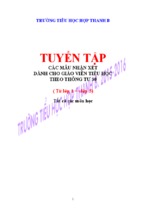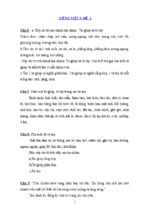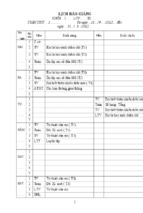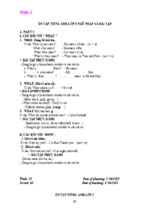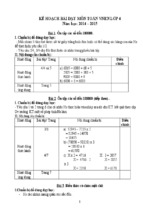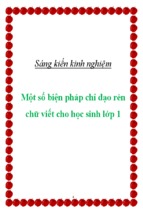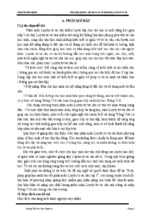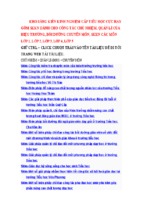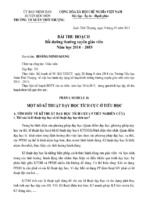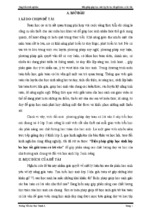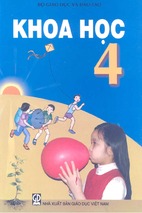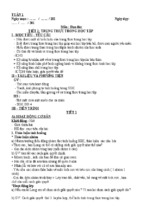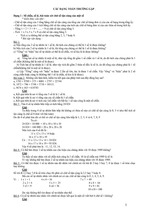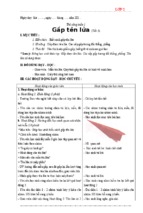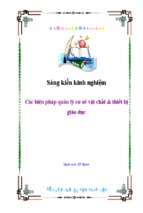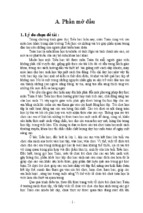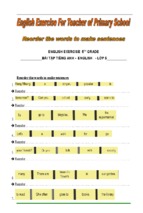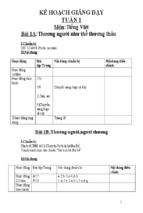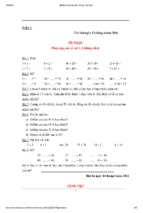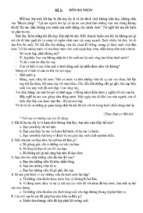PHÒNG GIÁO GDĐT TAM NÔNG
TRƯỜNG THCS AN HÒA
CỘNG HÒA XÃ HỘI CHỦ NGHĨA VIỆT NAM
Độc lập – Tự do – Hạnh phúc
TÀI LIỆU ÔN THI TUYỂN SINH 10
1. Hướng dẫn học sinh phương pháp làm bài đọc hiểu
Để làm tốt bài đọc hiểu đầu tiên phải nắm vững các cấu trúc ngữ pháp và một số
từ vựng. Vậy chúng ta cung cấp cho học sinh từ vựng theo chủ điểm. thường thì phần đọc
hiểu nên ôn sau phần ngữ pháp. Chúng ta cần ôn theo chủ đề để giúp học sinh nhớ từ theo
chủ đề.
1.1. Dạng mulitiple choice cloze test: Thường thì dạng này có thể là chọn từ đúng
theo ngữ cảnh hoặc từ theo ngữ pháp nên khi ôn giáo viên cần giúp cho học sinh cách
chọn từ theo ngữ cảnh hoặc phân tích chọn từ đúng ngữ pháp. Các bước làm đầu tiên nên
đọc đoạn văn lướt qua để nắm chủ đề, sau đó đọc từng câu hỏi và kiểm tra nghĩa hoặc
ngữ pháp. Thường thì loại bài tập này có thể chú ý từ ở trước và sau khoảng trống thường
có liên quan với nhau.
Reading 1:
Read the following passage and then choose the word (A, B, C or D) that best
completes each blank.
“My home is in the air – I do an enormous amount of traveling. It is a fast life and
(1) ______ of work, but I like it and that is the only way (2) ______ me. Everything is
tiring – music, traveling – but what can I do? I am not (3) ______ to complaining. It is
hard to imagine now (4) ______ I will ever be very long in one place. My home town is
on the Caspian Sea. There is sea, wind, sun and (5) ______ many tourists and hotels. I
have my own flat with four or five rooms, but I am seldom there. If I am there for a day or
two I prefer to (6) ______ with my mother and grandmother. They live in a small house,
(7) ______ it is very comfortable and my mother cooks for me. I like good, simple food.
I have no wife, no brothers or sisters and my father (8)______ when I was seven.
He was an engineer and I don’t (9)______ him very well. He liked music very much and
wanted me to (10) ______ a musician.”
1.A. most
B. full
C. complete
D. more
2.A. for
B. to
C. in
D. by
3.A. wanted
B. taken
C. used
D. known
4.A. and
B. so
C. while
D. that
5.A. far
B. too
C. much
D. more
6.A. stay
B. go
C. do
D. spend
7.A. but
B. since
C. even
D. which
8.A. killed
B. gone
C. passed
D. died
9.A. know
B. remember
C. remind
D. see
10.A. become
B. turn
C. develop
D. grow
Reading2:
Read the text carefully and choose the correct answer A, B, C or D.
1
The country is more beautiful than a town and (1) _________ to live in. Many
people think so and go to the country for the summer holidays though they can’t live there
all the year round. (2) _________ have a cottage (3) _________ in a village (4)
_________ they can go there whenever they can find the time.
English villages are not all (5) _________, but in some ways they are not very
different (6) _________ each other. (7) _________every village has a church. The round
or square tower of which can be seen for many miles around. Surrounding the church is
the (8) _________ where people are buried.
The village green is a wide stretch of grass and houses or cottages are built round
it. Country life is now (9) _________ comfortable and many villages have water brought
through pipes into each home.
Most villages are so close to some small towns (10) _________people can go there
to buy what they can’t find in the village shops.
1. A. please
B. pleasure
C. pleasant
D. pleased
2. A. some
B. Almost
C. Most
D. Others
3. A. to build
B. building
C. having built
D. built
4. A. so that
B. in order to C. so on
D. for instance
5. A. like
B. alike
C. likely
D. similar
6. A. to
B. from
C. with
D. about
7. A. Most
B. Most of
C. Almost
D. Almost of
8. A. churchyard
B. port
C. path
D. roundabout
9. A. fairly
B. alike
C. rarely
D. hardly
10. A. and
B. that
C. however
D. nevertheless
Reading 3
Choose A, B, C or D to complete the following passage.
My village is about 50 kilometers (1)___________ the north of the city center. It is
very beautiful and (2)___________place where people (3)___________ flowers and
vegetables only. It’s very famous for its pretty roses and picturesque scenery. The air is
quite fresh . However, the smell of the roses make people (4)___________ cool. In
spring, my villages looks lie a carpet with plenty of colors. Tourists come to visit it so
often.
1. A. to
B. for
C. from
D. on
2. A. peace
B. peacefully C. peaceful
D. quite
3. A. buy
B. grow
C. grew
D. bought
4. A. felt
B. to feel
C. feeling
D. feel
Reading 4:
Read the following passage and choose the best answer.
We don’t only choose clothes to make us look…1…., we also use them to tell the
world …2….our personality. The clothes we wear and our …3….as a whole give other
people useful information about what we think and…4….we feel. If we feel cheerful, we
usually wear …5….clothes and if we feel …6….we sometimes put on dark clothes. But
why do teenagers wear black so…7….? Is it because they feel miserable all …8….? This
2
is unlikely to be the case. It is probably just because it is …9….to wear black, and young
people they are real fans of …10…. .
1. A. attract
B. attractive
C. attractively
D. attraction
2. A. of
B. with
C. by
D. about
3. A. appear
B. appearance
C. appeared
D. appearing
4. A. which
B. what
C. how
D. when
5. A. colorful
B. colors
C. colorfully
D. colorless
6. A. depress
B. depressed
C. depressing D. depression
7. A. frequent
B. frequency C. frequently
D. frequence
8. A. the time
B. the day
C. the week
D. the month
9. A. fashion
B. fashionable
C. fashioner
D. fashioned
10. A. fashion
B. fashionable
C. fashioner
D. fashioned
Reading 5:
Clothes can tell a lot (1)………a person. Some people like very colorful clothes because
they want everyone (2)…………at them and they want to be the center of things. (3)
………. People like to wear nice clothes, but their clothes are not (4)…………..or fancy.
They do not like people (5)………….. Clothes today are very different (6)………… the
clothes of the 1800s.
One difference is the way they look. For example, in the 1800s, all women (7)
………… dress. The dresses all had long skirts. But today, women do not always wear
dresses with skirts. Sometimes they wear short skirts. Sometimes they wear pants.
Another difference between 1800s and today is the (8)…….. In the 1800s, clothes (9)
………… natural kinds of cloth. They were from cotton, wool, silk on linen. But today,
there are (10)………. Kinds of man made cloth. A lot of clothes are now made from
nylon, rayon or polyester.
1. A. about
B. at
C. with
D. on
2. A. look
B. to look
C. looked
D. looking
3. A. each other
B. another
C. others
D. other
4. A. color
B. colorfully
C. colorful
D. colored
5. A. to look at them B. to looking at them
C. looking at them D. looked at them
6. A. at
B. to
C. from
D. in
7. A. wear
B. worn
C. wore
D. wearing
8. A. cloth
B. clothing
C. clothe
D. clothes
9. A. were made only by
B. were made only of
C. were made only in
D. were made only from
10. A. many
B. much
C. any
D.a little
Reading 6
V. Reading. Choose A, B, C or D to complete the following passage.
English is a very useful __(1)__. If we know English, we can go to any
countries we like. We will not find it hard to make people understand __(2)__ we want
to say. English also helps us to __(3)___ all kinds of things. Hundreds of books are
_(4)_ in English every day in many __(5)__. English has also helped to spread ideas
3
and knowledge to all corners of the __(6)__. Therefore, the English language has
helped to spread better ___(7)__ and __(8)___ among countries of the world.
1. A. language
B. languages
C. linguist
D. linguistics
2. A where
B. when
C. what
D. which
3. A learnt
B. learning
C. to learn
D. learn
4. A write
B. wrote
C. written
D. writing
5. A. countrified
B. countries
C. country
D. countryside
6. A school
B. class
C. word
D world
7. A to understand
B. understanding
C. understand D. understood
8. A friend
B. friendly
C. friendliness D. friendship
Reading 7:
Reading the following passage and choose the best answers
LEARNING A LANGUAGE
Speech is one of the most important (1)_________of communicating. It consists of
far more than just making noises. To talk and also to (2)_________by other people, we
have to speak a language, that is, we have to use combinations of (3)_________that
everyone agrees stand for a particular object or idea. Communication would be impossible
if everyone made up their own language.
Learning a language properly is very (4)_________. The basic (5)_________ of
English is not very large, and only about 2000 words are needed to speak it quite …(6)….
But the more words you know, the more ideas you can (7)_________and the more precise
you can be about their exact meaning.
Words are the (8)_________ thing we use in communicating what we want to say.
The way we (9)_________ the words is also very important. Our tone of voice can
express many emotions and (10)_________whether we are pleased of angry, for instance.
1. A. ways
B. reasons
C. rules
D. tests
2. A. be examined B. be talked
C. be understood
D. be spoken
3. A. sounds
B. languages
C. systems
D. talks
4. A. important
B. expensive
C. simple
D. easy
5. A. word
B. vocabulary
C. grammar
D. structure
6. A. good
B. fluent
C. well
D. perfect
7. A. grow
B. need
C. pass
D. express
8. A. most
B. main
C. certain
D. full
9. A. send
B. talk
C. say
D. pass
10. A. asks
B. understands
C. knows
D. shows
Reading 8
Read the passage and circle the best answer to choose the word or phrase that best
fits each of the blanks.
Our oceans are becoming (1)___________ polluted. Most of this pollution comes from
the land, which means it comes from people. Firstly, there is raw sewage, which
is(2)___________ directly into the sea. Many countries, both developed and developing,
are guilty of doing this. Secondly, ships drop about six million tons of garbage into the
4
sea each year. Thirdly, there are oil spills from ships. A ship has an accident and oil leaks
from the vessel. This not only pollutes the water, but it also kills marine life. Next, there
are waste materials (3)___________ factories. Without proper regulations, factory owners
let the waste run directly into the rivers, which then leads to the sea. And finally, oil
(4)___________ washed from the land. This can be the result of carelessness or a
deliberate dumping of waste.
1. A. extreme
B. extremely C. extremes
D. extremeness
2. A. pumps
B. pumping
C. pumped
D. to pump
3. A. with
B. on
C. about
D. from
4. A. am
B. is
C. are
D. be
Reading 9:
Choose the word or phrase (A, B, C or D) that best fits the blank space in the
following passage
Mr. Brown and some . . . . . . . . . . . . . . . . . . . . . . . . .(1) conservationists are on a
very dirty beach now. Today they are ready to make the beach a clean and beautiful place
again.
After
listening
to
Mr.
Brown’s
instructions,
they
are
divided . . . . . . . . . . . . . . . . . . . . . .(2) three groups. Group 1 needs to walk along the
shore. Group 2 should check the sand, . . . . . . . . . . . . . . . . . . . . .(3) group 3 has to check
among the rocks. Garbage must be put into plastic bags, and the bags will
be……………………………...(4) by Mr. Jones. He will take the bags to the garbage
……………………(5). Each member is given a map to find the right place. They won’t
eat the picnic lunch …………………………(6) by Mrs. Smith until the whole area is
clean ………………………..(7) are eager to work hard so as to refresh this
……………………………….(8) area.
1. A. voluntary
B. volunteers
C. volunteering
D. volunteer
2. A. in
B. to
C. into
D. onto
3. A. or
B. and
C. because
D. thought
4. A. selected B. chosen
C. collected
D. elected
5. A. dump
B. yard
C. area
D. place
6. A. happened
B. provided
C. achieved
D. shown
7. A. Them all
B. They all
C. All them
D. spoils
8. A. spoiling
B. spoil
C. spoiled
D. spoils
Reading 10:
Tet or Lunar New Year is the main holiday for Vietnamese people. It is the most
important celebration in the year which falls sometimes between January 19 and February
20. Tet marks the beginning of spring and it’s a time for family members who live apart
try to be together. The preparations and celebrations used to be spread over months but
nowadays the holiday is much shorter. However, there is great excitement building up
well before Tet. Streets are decorated with colored lights and red banners. Shops are full
of goods. People buy gifts, clean and decorate their houses and cook traditional foods.
On the first days of Tet, people try to be nice and polite to others. They visit their
relatives or friends and exchange New Year’s wishes. Children receive the “lucky money”
inside red envelopes. Many people go to pagodas to pray for a happy new year for
5
themselves and their family. Tet is really a time of fun and festivals throughout the
country.
Read the pasage and choose the best answer for each question
1. Tet or Lunar New Year is the main __________ for Vietnamese people.
a. work day
b. vacation
c. year
d. chance
2. Tet’s a time for family __________ who live apart try to be together.
a. members
b. friends
c. partners
d. neighbors
3. On the first days of Tet, people try to be nice and polite to others.
a. wear unpleasant clothes
b. wear ugly clothes
c. wear beautiful clothes
d. wear uncomfortable clothes
4. Nowadays theTet holiday is much __________than in the past.
a. longer
b. higher
c. lower
d. shorter
5. Many people go to pagodas to pray for ___________ for themselves and their family.
a. happiness
b. luck
c. wealth
d. all are correct
1.2. Dạng True/ false thì đọc câu True/ false
Tìm từ khóa trong câu true/ false trước.
Sau đó đọc lướt qua đoạn văn đến khi thấy có một số thông tin liên quan ta dừng
lại đọc kỹ đoạn đó để tìm đáp án.
1.3. Dạng Multiple choice questions:
Đọc cả bài text 1 lần
Ta đọc câu hỏi để tìm từ khóa trước và đọc đáp án. Lần lượt đọc từng câu dò lên
đoạn văn đến khi thấy xuất hiện từ khóa thì dừng lại đọc kỹ để chọn đáp án.
Nếu chưa chọn được thì đọc lại cẩn thận và dùng phương pháp loại trừ đáp án không có
thông tin trong bài. Đôi lúc cần chú ý học từ đồng nghĩa và trái nghĩa.
Reading 11
Read the passage and choose the best answer.
Ted Robinson has been worried all the week. Last Tuesday he received a letter
from the local police. In the letter he was asked to call at the station. Ted wondered why
he was wanted by the police but he went to the station yesterday, and now he is not
worried any more. At the station, he was told by a smiling policeman that his bicycle had
been found. Five days ago, the policeman told him, the bicycle was picked up in a small
village four hundred miles away. It is now being sent to his home by train. Ted was most
surprised when he heard the news. He was amused too, because he never expected the
bicycle to be found. It was stolen twenty years ago when Ted was a boy of fifteen!
1. What happened to Ted last week?
A. He lost his bicycle.
B. He received a letter from his friend.
C. He was asked to go to the local police station.
D. He called the local police.
2. The policeman who met Ted at the station was ......
A. impolite
B. friendly
C. generous
D. reserved
3. Where was the bicycle found?
A. At the station B. On the train
C. In a village
D. In a city
4. Ted was surprised when he heard the news because ..............
6
A. his bicycle was found five days ago.
B. he believed that the police would find his bicycle.
C. his bicycle is being sent to his home by train.
D. he didn't think his bicycle would be found.
5. How old is Ted now?
A. 35
B. 25
C. 45
D. They worry about the environment.
D. 55
Reading12
Advertisements are very important in the modern world. Often your T-shirt or jeans show
the name of the company that made them. This is a popular form of advertising. A special
picture or symbol, called logo, is sometimes used. You see logos on many different
products. The idea of a logo is that whenever you see it, you think of that product or
company. Many people like to buy a product because it is made by a certain company.
Some people only buy a product that is made by a famous company. People wear clothes
and carry bags that have a famous label to show that they are fashionable and have good
taste. It is very common to see advertisements on TV and hear them on the radio. Most
advertisements are only a few seconds long but very attractive. Sometimes, the advertiser
uses a slogan because it is easy to say and easy to remember.
The idea of advertisements is to try to make you buy the product. They sometimes show
rich and famous people using that product. The message is, if you want to feel rich and
famous, then buy this product.
Choose the most suitable ending to each of the following sentences.
1. A logo is a ____.
A. company’s name
B. special company
C. type of product
D. company symbol
2. A popular form of advertising is to ____.
A. wear jeans
B. use logo
C. watch TV
D. use different products
3. A good slogan is ____.
A. easy to remember
B. useful to produce
C. simple to make
D. easy to buy
4. The main purpose of an advertisement is to _________.
A. sell you something you do not want B. make you feel rich and famous
C. make you buy the product
D. pay the TV station
Reading13
Read the passage below then pick out ONE best option (A, B, C or D . to complete
each of the following sentences:
Britain is now a highly industrialized country and there are only 238,000 farms in
the UK. More and more farmers leave the land because they can not earn enough money
to survive. Only large farms are economic and because of this most British farm are big.
They usually grow cereals in the east of England and raise sheep and cows in the north of
7
England and Scotland. The small family farms often have to earn more money by
offering bed and breakfast accommodation to tourists.
1.British farmers leave the land because________ .
A. they can’t earn their own living by farming B. they are tired of the farm work
C. they want to continue to live
D. they are forced to leave the land
2. Most British farms are big because_________ .
A. there are plenty of abandoned land
B. farming is now industrialized
C. large farms are economic
D. most British farmers are rich
3. People usually grow ________ in the east of England
A. rice
B. cereals
C. corns
D. vegetables
4.The small family farms often offer bed and breakfast accommodation to tourists
______.
A. to show their friendship.
B. to have more tourists to their farms.
C. so that the tourists will return to their farm. D. in order to earn more money.
Reading 14
Giang, a student from Dong Thap province, is an exchange student in the USA. He
is now living with the Parker family on a farm 100 kilometers outside Columbus, Ohio.
He will stay there till the beginning of October. Mr. Parker grows maize on his farm,
while Mrs. Parker works part-time at a grocery store in a nearby town. They have two
children. Peter is the same age as Giang, and Sam is still in primary school. Since his
arrival, Giang has been learning a lot about life on a farm. He has also been able to
improve his spoken English. As soon as he completes his homework, he helps feed the
chickens and collect the eggs. He really enjoys himself spending his summer vacation this
way.
1. How long will Giang stay with the Parker?
A. till the beginning of December
B. till the beginning of November.
B. till the beginning of October
D. till the beginning of August
2. What does Mr. Parker do?
A. works part- time at a grocery store
B. a farmer
C. housewife D. worker
3. What does Mrs. Parker do?
A. works part- time at a grocery store
B. a farmer
C. teacher D. worker
4. How many children does the Parker family have?
A. 1
B.2
C.3
D.4
5. What does Giang do after finishing his homework?
A. He studies English
B. He plays baseball
C. He feeds the chicken and collects their eggs
D. He feeds the chicken
Reading 15
Read the passage carefully and choose the correct answer:
In the early years of television, educational specialists believed that it would
be very useful in teaching and learning. Many schools have brought television sets,
intending to use them effectively to improve the quality of education; but actually they are
rarely used properly in classrooms. Meanwhile, children spending the majority of their
8
out-of-school hours watching TV and their typical school days proceed as if television did
not exist.
There are some explanations for the failure of television to get the interest
of the teachers. Firstly, the schools that purchased television sets have not set aside money
for equipment repairs and maintenance so these television sets are sooner and later out of
work. Secondly these schools have not found an effective way to train teachers to
integrate television into their ongoing instructional programs. Lastly, most teachers do not
regard the quality of television and its usefulness in the classroom.
Teachers at the schools work hard for at least twelve years to train their
students to become good readers. However, according a recent statistics, teenagers seldom
spend their free time reading books and newspapers but watching television instead.
1) The text is about:
A. the use of television at schools.
B. teaching and learning television
C. educational specialists.
D. watching TV outside school.
2) When TV first appeared, educational specialists . . . . . . . .
A. did not appreciate it.
B. did not appreciate it.
C. believed it would be useful for schooling.
D. banned children from watching TV.
3) According to the text, TV . . . . . . . . .
A. has not been used properly in classrooms.
B. has been used effectively in classrooms.
C. has not existed in classrooms.
D. has not attracted students’ interest.
4) There are . . . . . . . . . explanations for the failure of television to get the interest of the
teachers.
A. two
B. three
C. four
D. five
5) Children spend their free time . . . . . . . . . . . . . .
A. reading books
B. reading newspapers.
C. learning foreign languages
D. watching TV.
Reading 16:
Read the passage and choose the best answer
Are you looking for a cheap, clean, effective source of power that doesn’t cause
pollution or waste of natural resource? Look no further than solar energy from our sun. At
present, most of our electricity comes from the use of coal, gas, oil, or nuclear power.
This power could be provided by the sun. one percent of solar energy that reaches the
earth is enough to provide power for the total population. Many countries have already
used solar energy. Solar panels are placed on the roof of a house and the sun’s energy is
used to heat water. The energy can be stored for a number of days, so on cloudy days you
can use solar energy, too. Sweden has an advanced solar energy program. There, all
9
buildings will be heated by solar energy and cars will use solar power instead of gas by
the year 2015.
1. Where does most of our electricity come from?
A. gas
B. gas, coal, oil, or nuclear power
C. coal
D. oil
2. What is the cheap, clean, effective source of power that doesn’t cause pollution or
waste natural resources?
A. nuclear power
B. solar energy
C. Solar panel
D. solar
3. Where are Solar panels placed?
A. under the roof
B. outside the house C. on the roof
D. in the house
4. When will cars use solar power instead of gas in Sweden?
A. By the year 2050
B. By the year 2045
C. By the year 2025
D. By the year 2015
Reading 17
More than two hundred years ago, the term “environmental pollution” was very strange to
people. They lived healthily, drank pure water, and breathed fresh air. Nowadays the
situation is quite different. People all over the world are worried about things that are
happening to the environment. Actually it is man that is destroying the surroundings with
many kinds of wastes. Everybody knows that motorbikes and cars emit dangerous gases
that cause poisonous air and cancer, but no one wants to travel on foot or by bicycle.
Manufactures know that wastes from factories make water and soil polluted, but they do
not want to spend a lot of their money on treating the wastes safely. Scattering garbage is
bad for our health, but no one wants to spend time burying it. Is it worth talking a lot
about pollution?
Read the text again and circle the best answer for each question (1,5ms)
1. What was strange to people more than two hundred years ago?
A. Environment
B. Environment pollution C. Pure water
D. Fresh air
2. How did people live in the past?
A. They lived healthily.
C. They breathed fresh air.
B. They drank pure water.
D. All of these
3. Who is destroying the surroundings nowadays?
A. The environment itself
C. It is man.
B. People from other planets
D. Animals
4. Is scattering garbage good or bad for our health?
A. Yes, it is
B. No, it isn’t
C. It is good
D. It is bad
5. Why don’t manufactures treat the wastes from factories?
A. They don’t want to spend a lot of their money.
B. They know that the wastes make pollution.
C. They want to treat the wastes safely.
Reading 18:
Read the text then choose the best answer to fill in the blank.
I often hear or read about “natural disasters” – the eruption of Mount St. Helen, a
volcano in the state of Washington; Hurricane Andrew in Florida; the floods in the
10
American Midwest; terrible all over the world; huge fires; and so on and so on. But I’ll
never forget my first personal experience with the strangeness of nature – “the London
Killer Fog” of 1952. It began on Thursday, December 4, when a high – pressure system
(warm air) covered southern England. With the freezing – cold air below, heavy fog
formed. Pollution from factories, cars, and coal stoves mixed with the fog. The humidity
was terrible high, there was no breeze at all. Traffic (cars, trains, and boats) stopped.
People couldn’t see, and some walked onto the railroad tracks or into the river. It was
hard to breathe, and many people got sick. Finally, on Tuesday, December 9, the wind
came and the fog went away. But after that, even more people got sick. Many of them
died.
1. Which “natural disaster” isn’t mentioned in the text?
A. a volcano
B. a flood
C. a hurricane
D. a tornado
2. What is his unforgettable personal experience?
A. the London killer.
B. the heavy fog in London in 1952.
C. the strangeness of nature.
D. a high – pressure system.
3. How long did the “London Killer Fog” last?
A. for four days.
B. for five days.
C. for six days.
D. for a week.
4. What didn’t happen during the time of “London Killer Fog”?
A. heavy rain.
B. humidity.
C. pollution.
D. heavy fog.
5. Why did the traffic stop?
A. Because of the rain.
B. Because of the windy weather.
C. Because of the humid weather.
D. Because of the heavy fog.
Reading 19:
Read the following passage and answer the questions
Everyday on radio, on TV, and in the newspaper, we hear, see or read about many
problems in the world, for example, pollution problems.
Air pollution is the first kind. It mostly comes from fumes released from motorbikes,
cars, airplanes, trains and poisonous gases emitted from factories. Also, waste is dumped
any where, even in the city where many people are living. The second pollution problem
is sea pollution. Many people earn their living from fishing in the sea, and the fish they
catch feed many people. But the sea has become so polluted from oil spills and factory
wastes that the fish are dying. This pollution is not only killing the fish, but is also
affecting those people who eat fish.
Seldom do you find a place nowadays that is not polluted. This problem is growing
more difficult everyday. We must find a good solution that makes the world a better place
to live.
1. We hear, see and read about problems in the world _________
A. once a week
B. every day
C. every week
D. every year
2. What causes the air pollution ?
A. fumes from vehicles.
B. poisonous gases from factories.
C. waste from everywhere
D. all are correct
3. The sea has become polluted because of _________
A. oil spills
B. factory wastes
C. smoke from factories
D. a and b are correct
11
4. In order to make the world a better place to live, we _________
A. should not prevent pollution B. should find a good solution.
C. should kill the fish.
D. None is correct.
Reading 20
St. Valentine’s Day is a celebration of romance and love. This holiday comes from an
ancient Roman festival called the Feast of Lupercalia after a Roman called St.
Valentine who was martyred for refusing to give up Christianity. He died on February
14th, and the date was set aside to honor him. St. valentine was named the patron saint
of lovers and February 14th became the dated for exchanging love letters or massages
and for sending flowers (usually red roses), and chocolate candy to a loved one. St.
valentine's Day colors are red and white. School children have classroom parties with
Valentine candy and pass out Valentine cards to each other.
1. Is St. Valentine’s Day a celebration of romance and love?
A. Yes, it is
B. Yes, it does
C. No, it isn’t
D. No, it doesn’t
2. Where does this holiday come from?
A. German festival
B. French festival
C. Roman festival
D. English festival
3. Why is St. valentine’s Day celebrated on February 14th?
A. to name him
B. to honor him
C. to pay him
D. to know him
4. What do school children do on this day?
A. have parties
B. send candy
C. give cards
D. all are correct
Reading 21:
Tet or Lunar New Year is the main holiday for Vietnamese people. It is the most
important celebration in the year which falls sometimes between January 19 and February
20. Tet marks the beginning of spring and it’s a time for family members who live apart
try to be together. The preparations and celebrations used to be spread over months but
nowadays the holiday is much shorter. However, there is great excitement building up
well before Tet. Streets are decorated with colored lights and red banners. Shops are full
of goods. People buy gifts, clean and decorate their houses and cook traditional foods.
On the first days of Tet, people try to be nice and polite to others. They visit their
relatives or friends and exchange New Year’s wishes. Children receive the “lucky money”
inside red envelopes. Many people go to pagodas to pray for a happy new year for
themselves and their family. Tet is really a time of fun and festivals throughout the
country.
Read the passage and then tick True or False .
STATEMENTS
1.
Lunar New Year is the most important celebration for Vietnamese people.
2.
Vietnamese people used to enjoy Tet for a month.
3.
People clean and decorate their homes and cook traditional foods.
4.
Children give the “lucky money” to their parents.
5.
Tet is really a time of fun and festivals for the whole country.
12
T
T
F
F
T
F
T
Reading 22:
Read the text carefully and then choose the best answer among A/B/C or D.
FOOTPRINTS ON THE MOON
Long ago a lot of people thought the moon was a god. Other people thought it was
just a light in the sky. And others thought it was a big ball of cheese!
The telescopes were made. And men saw that the moon was really another world.
They wondered what it was like. They dreamed of going there.
On July 20,1969, that dream came true. Two American men landed on the moon.
Their names were Neil Armstrong and Edwin Aldrin. The first thing the men found was
that the moon is covered with dust. The dust is so thick that the men left footprints where
they walked. Those were the first marks a living thing had ever made on the moon. And
they could stay there for years and years. There is no wind or rain to wipe them off.
The two men walked on the moon for hours. They picked up rocks to bring back to
earth for study. They drug up dirt to bring back. They set up machines to find out things
people wanted to know. Then they climbed back into their moon landing craft.
Next day the landing craft roared as the two men took off from the moon. They
joined Michael Collins in the spaceship that waited for them above the moon. Then they
were off on their long trip back to earth. Behind them they left the plains and tall
mountains of the moon. They left the machines they had set up. And they left footprints
that may last forever.
1. This story tells _____.
A. about the first men to walk on the moon.
B. how men found footprints on the moon.
C. what the men brought back from their trip to the moon.
D. who had left footprints on the moon before the two men landed there.
2. A telescope _____.
A. makes balls of light seem brighter.
B. turns the moon into another world.
C. makes many of men’s dreams come true.
D. makes faraway things seem closer.
3. The men brought rocks and dirt from the moon because _____.
A. they wanted something to show they were there.
B. people wanted to use them to learn about the moon.
C. they wanted to keep them as souvenirs.
D. they might sell them to scientists.
4. The Americans’ machines will most likely stay on the moon until _____.
A. someone takes them away.
B. a storm covers them with dust.
C. rain and wind destroy them.
D. they become rusty and break to pieces.
5. The next people who go to the moon most likely could _____.
A. find that the machines have disappeared.
B. leave the first set of footprints on the moon.
C. find the places where Armstrong and Aldrin walked.
13
D. find that dust had wiped off the two men’s footprints.
2. Hướng dẫn học sinh làm bài tập về “giới từ”
2.1. Định nghĩa về giới từ: Giới từ là từ loại chỉ sự liên quan giữa các từ loại trong cụm
từ, trong câu. Những từ thường đi sau giới từ là tân ngữ (Object), Verb + ing, Cụm danh
từ ...
2.2. Cách sử dụng giới từ trong tiếng Anh: Trong tiếng Anh, người ta không thể đặt ra
các quy luật về các phép dùng giới từ mang tính cố định cho mỗi giới từ đó - cùng một
giới từ, khi đi với từ loại khác nhau thì tạo ra nghĩa khác nhau. Vậy chúng ta nên học
thuộc mỗi khi gặp phải và học ngay từ lúc ban đầu.
2.3. Vị trí của giới từ trong tiếng Anh
- Sau TO BE, trước danh từ
Ex: The book is on the table
- Sau động từ: Có thể liền sau động từ, có thể bị 1 từ khác chen giữa động từ và giới từ.
Ex: I live in Ho Chi Minh city.
- Sau tính từ
Ex: I’m not worrieed about living in a foreign country.
2.4. Hình thức của giới từ trong tiếng Anh
- Giới từ đơn ( simple prepositions ): Là giới từ có một chữ : in, at, on, for, from, to,
under, over, with …
- Giới từ đôi ( doubleprepositions ): Là giới từ được tạo ra bằng cách hợp 2 giới từ đơn lại
:Into, onto, upon, without, within, underneath, throughout, from among … - Giới từ kép ( compound prepositions ): Là giới từ được tạo thành bằng tiếp đầu ngữ a
hoặc be: About, among, across , amidst, above, against, Before, behind, beside, beyond,
beneath, between, below…
- Giới từ do phân từ ( participle prepositions ): According to, considering, excepting.
- Cụm từ được dùng như giới từ: Giới từ loại này bao gồm cả một cụm từ : because of, in
spite of, by means of,…
2.5. Các loại giới từ thường gặp trong tiếng Anh
- Giời từ chỉ thời gian:
+At : vào lúc ( thường đi với giờ )
+On : vào ( thường đi với ngày )
+In : vào ( thường đi với tháng, năm, mùa, thế kỷ )
+ Before: trước
+ After : sau
+ During : ( trong khoảng) ( đi với danh từ chỉ thời gian )
- Giời từ chỉ nơi chốn:
+ At : tại ( dùng cho nơi chốn nhỏ như trường học, sân bay...)
+ In : trong (chỉ ở bên trong ) , ở (nơi chốn lớn thành phố, tỉnh ,quốc gia, châu lục...)
+ On,above,over : trên
- Giời từ chỉ sự chuyển dịch:
+ to: chỉ hướng tiếp cận tới người,vật,địa điểm.
+ into: tiếp cận và vào bên trong vật,địa điểm đó
+ onto: tiếp cận và tiếp xúc bề mặt,ở phía ngoài cùng của vật,địa điểm
+ From: chỉ nguồn gốc xuất xứ Ex: i come from vietnamese
14
+ Across : ngang qua Ex: He swims across the river. ( anh ta bơi ngang qua sông)
+ Along : dọc theo
+ Round,around,about: quanh
- Giới từ chỉ thể cách:
+ With : với
+ Without : không, không có
+ According to: theo
+ In spite of : mặc dù
+ Instead of : thay vì
- Giới từ chỉ mục đích:
+To : để
+ In order to : để
+ For : dùm, dùm cho
+ So as to: để
- Giới từ chỉ nguyên do:
+Thanks to : nhờ ở
+ Through : do, vì
BÀI TẬP
Fill in the gaps using a suitable preposition
1. Tell us something ________ your holiday. (about)
2. I sometimes wonder ________ my old friend, where she is now and what she's doing.
(about)
3. The glass is full _____ water. (of)
4. They congratulated the speaker _____ his speech. (on)
5. He seemed very bored ______ life. (with)
6. I won't see you______ Friday. (till)
7. You must clean this table _____ ink spots. (from)
8. He is just getting _______ his severe illness. (over)
9. My house is just ______ the street. (across)
10. Aren't you glad that you went to the party with us_______all? (after)
11. He made a speech______ this subject. (on)
12. He complained ______ the children ______ the mess they've made. (about-of)
13. Turn this passage from English_______ Spanish. (into)
14. I'm not very good ______ making decisions. (at)
15. I will stay in London_____ about three weeks. (for)
16. She reminds me_______ my mother. (of)
17. I'm going______ the shop to buy some milk. (to)
18. "Where's Tom?" - "He's ______ the kitchen making some coffee." (in)
19. Shelly sat here _______ me. (with)
20.The train will leave ______ five minutes. (in)
21. The children didn’t come back home ________ 8p.m (till)
15
22 . She talked________an hour to persuade her parents . (for)
23. They have played tennis ________9p.m . (since)
24. They have learnt English ________ many years . (for)
25 . The boys often go skiing ________ the winter . (in)
26. Police officers have to wear uniform when they are ______ duty. (on)
28. I am preparing for the picnic_______ my friends tomorrow. (with)
29. Please bring some raincoats just_______ case. (in)
30.The board awarded the first prize ______ the reporter. (to)
31.Have you sent the christmas cards _____ your family? (to)
32.The committee appointed Alice secretary ______ the meeting. (for)
33.He hides the broken cup _____ the drawer. (in)
34. They are playing _______ Liverpool players. (versus)
35. All competitors take part ______ the Olympic Games in the spirit of sportsmanship.
(in)
36. _______the afternoon, mum feeds the chickens. (in)
37.They moved the fridge ______ the living room. (into)
38.She bought some cups ______ tea to the visitors in the next room. (of)
39. They will come here________11.30 AM. (at)
40. There is a meeting_________ 9;00Am and 2;00 PM. (between)
41. She took many pictures to show the trip_________ her parents. (with)
42. He was born_________ 15th January. (on)
43. We have lived in Ha Noi_________ 4 years. (for)
44.We thought the two films were very similar _______ a great extent. (to)
45. Someone is going to serve Jack breakfast in bed ______ his birthday. (on)
46. You should open the wine _______ three hours before you use it. (about)
47. You must not hammer nails into the walls ________permission. (without)
48. People must not leave bicycles ______ the hall. (in)
49. Members can keep books ______three weeks. (for)
50. We have English _______ Monday. (on)
51. You must turn off all the switches ______ leaving the room. (before)
52. You must make an appointment _____ advance . (in)
53. I first met him a long time _______ (ago)
54. Could you turn_______ the radio? I am doing my homework. (off)
55. He stopped to smoke because cigarettes are harmful _____ his health. (to)
56. She was waiting nervous in the waiting room _______the interview. (for)
57. They asked me what did happen last night, but I was unable _______ tell them. (to)
58. They cancelled all the flights because _______ the fog. (of)
59. My parents saw me______at the railway station . (off)
60. Somebody is using the computer _______the moment. (at)
61. The police have _______ released John. (just)
62. We ofen go for awalk_________the weekends. (on)
63. My village is about 100 kilometers________the south of HCM City. (from)
64. There is a shrine________the top of the mountain near my uncle’s house. (on)
16
65. We will go________a picnic next week. (on)
66. The boys carried the heavy box ______the room last week. (into)
67. Our parents warned us not to go ______ alone. (out)
68. They are building a new highway ______ the city next year. (around)
69. They had to postpone the meeting because _____ illness. (of)
70. We will send you the results as soon _____ they are ready. (as)
71. The word Jeans comes __________ a kind of material that was made I Europe. (from)
72. They installed a new pump to supply water _____the town. (for)
73. The material, called jean, was named_________ sailors from Genoa. (after)
74. People like wearing jeans because the material doesn’t wear________easily. (out)
75. Please hurry. We need these documents _______ delay. (without)
76. They have sold that old house at the end _____the road. (of)
77. Jeans have never been ____ fashion because a lot of people are still fond of wearing
them. (out)
78. Are you acquainted ______________ this man? (with)
79. It was very nice ___________ him to give me a lift. ( of )
80. Smoking is harmful____________ our health. ( to)
81. Mary always take good care ________her children. (of )
82. Our study is very important__________ our future and useful __________ our
Country. (for/ for)
83. Why don't you ask _________a pay increase? (for)
84. Don't shout ________the child when he makes a mistake. (at)
85. Ken prefers Chinese food ________French food. (to)
86 How long have they been working _________the company? (for)
87. He wore a hat, which made him look _________a spy. (like)
88. I think your mother should let you make ________your own mind. (up)
89. The pens made ____________ plastic are very cheap . (of)
90. Many of the stories are based ________ rumor. (on)
91. Was your friend successful________ getting a loan from the bank? (in)
92. If you look __________ the book, you can find what you need. (through)
93. You should make use __________ the books you have. (of )
94. She was very upset__________ the news of her father’s death. (about)
95.How would the body react ______ the extreme changes in temperature? (to)
96.We congratulate you ______ your successful flight. (on)
97.The American people shared ______ the Soviet people their satisfaction for the safe
flight. (with)
98.Most of the streets were named ______ national heros. (after)
99.China became the third country in the world to be able to independently carry
_______manned space flights. (out)
100. He was in orbit around the Earth ______ a speed of more than 17,000 miles per hour.
(at)
3. Luyện tập cho học sinh dạng bài tập nhận ra lỗi sai trong câu
BÀI TẬP
PART A
17
1. I wish my mother gives me presents more often.
A
B C
D
2. The teacher was pleasing with the result of your examination.
A
B C
D
3. I would rather live on a farm than to live in a city.
A
B C
D
4. The students suggested buying flowers for the teachers in the Teachers' Day.
A
B
C
D
5. No one have solved such a difficult problem.
A
B C
D
6. If you write the essay careful, you will get good mark.
A
B
C
D
7. The girl who were injured in the accident is now in hospital.
A
B
C
D
8. The man who I was waiting for didn't turn up.
A
B C
D
9. This text is too long for me to read it.
A
B
C D
10. My father doesn't know speak English.
A
B
C
D
11. There always is one wise woman who is both feared and respected by her people.
A
B
C
D
12. The lesson that we are learning now is very interested but difficult.
A
B
C
D
13. The village that I was born and grew up is situated on the Red River.
A
B
C
D
14. The child ran fastly to get to school.
A
B C
D
15. If it will rain this afternoon, we will have to cancel our picnic.
A
B
C
D
16. If airplane ticket wasn't expensive, I could fly to Singapore for my holidays.
A
B
C
D
17. Although she is 103 but she still does a lot of work in the flat.
A
B
C
D
18. She did not want to go back to the shops because it was very lately.
A
B
C
D
19. He doesn't buy a ticket every day so he has a season ticket.
A
B
C
D
20. We are interested of the conservation of forests.
A
B
C
D
21. The woman who come in does not know the man well.
A
B
C
D
22. Small children doesn't understand that hot water and hot drinks can be dangerous.
A
B
C
D
23. Most of them were build in the nineteenth century and some are very grand.
18
A
B
C
D
24. If you ever go into a house in Japan, you must remembering to take off your shoes.
A
B
C
D
25. In Canada much people speak English because they also came from England many
years ago.
A
B
C
D
26. Jim gets up at half past seven everyday, has breakfast at eight o'clock, and starts
works at half past nine.
A
B
C
D
27. Brunei is one of the smallest but most rich countries in the world.
A
B
C
D
28. I feel very happy to get your letter after so a long time.
A
B
C
D
29.Lan suggested learn English in teamwork.
A B
C
D
30.I wish I will visit Ha Long bay someday.
A
B C
D
31.A person whom takes care of sick people is called a doctor.
A
B
C D
32.Miss Huong finished her assignment but she was tired.
A
B
C
D
33. He usually pratices English songs,so he sings them beautiful.
A
B
C
D
34. I think we should to buy some candles before a typhoon.
A
B
C
D
35. I suggest to fix the roof of the house because there may be raining hard.
A
B
C
D
36. Tet is the festival who occurs in late January or early February
A
B
C D
37. Mike and Harry are visiting a woman who they meet on holiday.
A
B
C
D
38. How about to use public buses instead of cars?
A
B
C
D
39. If today is Sunday, we’d go to the beach.
A
B
C
D
40.Thank you for looking up the children while I was out.
A
B
C
D
41. I want go to bed now because I am tired.
A B
C
D
42. I suggest go camping next Sunday.
A B
C
D
43. These children speak English quite good.
A
B
C
D
44. Three buildings were build last year.
A
B C
D
19
45. My sister enjoys go to the park on Summer evening.
A B C
D
46. There’s the woman which sold me the handbag.
A
B
C
D
47. If I am you, I would take a taxi to the airport.
A
B
C
D
48. Mr. Smith is going to buy a new Japanese car, doesn’t he?
A
B
C
D
49. Shall we going to school by bus?
A B
C
D
50. Though he is poor, but he is still a good student.
A
B C
D
KEY
1.B
2.C
3.D
4.D
5.A
6.C
7.B
8.B
9.D
15. 16. 17. 18. 19. 20. 21B 22.
B
B
C
D
D
B
A
29B 30B 31A 32C 33D 34B 35A 36.
A
43. 44. 45. 46. 47. 48. 49. 50.
B
D
C
B
C
A
B
C
23.
B
37.
C
PART B
1. Please bring some raincoats just on case.
A
B
C D
2. If you know where she lives, please let me to know.
A
B
C
D
3. The sun rises in the East and set in the West.
A B
C D
4. He got wet so he forgot his umbrella.
A
B
C
D
5. I can’t play the piano, but I wish I can.
A
B
C
D
6. Mozart was born in Salzburg at 1756.
A B C
D
7. She worked hard, but she passed her exam.
A B
C
D
8. Nam said that he is living in London then.
A
B C
D
9. My sister enjoys go to the park on Summer evening.
A
B C
D
10. She lives in Rome when she was a little girl.
A B
C
D
11. If I am you, I would take a taxi to the airport.
A
B
C
D
20
10.
C
24.
C
38.
B
11.
A
25.
B
39.
C
12.
C
26.
D
40.
D
13.
A
27.
C
41.
B
14.
B
28.
C
42.
B
- Xem thêm -


